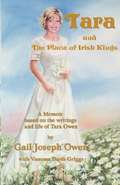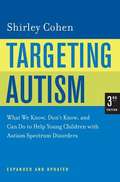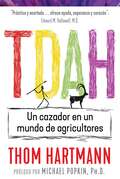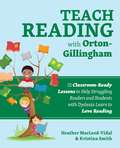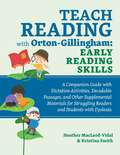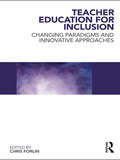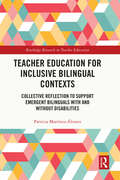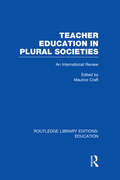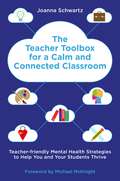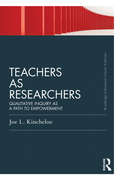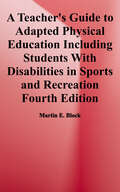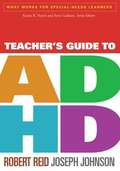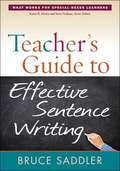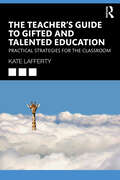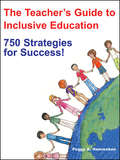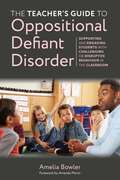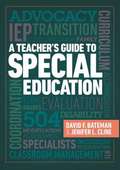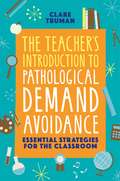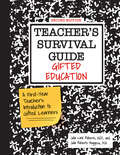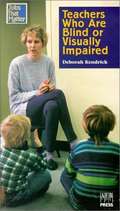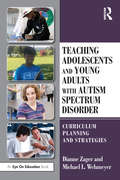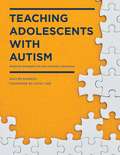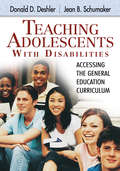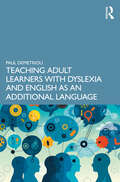- Table View
- List View
Tara and the Place of Irish Kings: A Memoir Based on the Writings and Life of Tara Owen, June 18, 1973 - October 24, 2001
by Gail Joseph Owen Vanessa Davis GriggsTara Owen was born with cystic fibrosis (CF). A beautiful young woman, she fought courageously to live life on her own terms. She continued to fight for over 28 years, until a tragic error brought her battle to an end. This story is not about her death; it's about her life. Smart, beautiful, and full of love with so much to live for, yet she had every reason to have had an understandably lousy attitude. Tara's story will fill you with hope and a sense of purpose. Facets of her life are included in this story where wisdom nuggets permeate. With such love for family and a fondness for a farm she called, "The place fit for Irish kings," this story is a celebration of Tara's life and the people that meant the most to her. The reality of the illness she bravely battled will be part of the story. How else could her story be told? It's an account of perseverance, hope, love, and the desire to live life to its fullest. We'll take the journey with Tara from birth until her death. And in the space of her life, we'll learn what it means to love and to triumph through adversity, regardless. Twenty-eight years may not be long for many, but when one has inside them the heart of kings, great times and a life of love and being loved will somehow encompass you.
Targeting Autism: What We Know, Don't Know, and Can Do to Help Young Children with Autism Spectrum Disorders (3rd edition)
by Shirley CohenTargeting Autism reaches out to everyone who lives with or cares about a young child with autism. First published in 1998 and updated in 2002, author Shirley Cohen has recast this best seller throughout to chart the dynamics of the autism world in the first years of the twenty-first century. In this expanded edition she provides specifics about the new developments that have modified the map of the world of autism or that may do so in the near future.
TDAH: Un cazador en un mundo de agricultores
by Thom Hartmann• Explica que las personas con TDAH no tienen trastornos, sino que son &“cazadores en un mundo de agricultores&”; es decir, poseen un conjunto de habilidades mentales únicas que les habrían permitido prosperar en una sociedad de cazadores-recolectores • Ofrece métodos y prácticas concretas y sin fármacos para ayudar a los &“cazadores&”, y a sus padres, maestros y administradores, a aceptar sus diferencias, fomentar la creatividad y encontrar el éxito en la escuela, el trabajo y el hogar • Revela cómo algunas de las personas más exitosas del mundo pueden ser etiquetadas como cazadores con TDAH, incluidos Benjamin Franklin, Thomas Edison y Andrew CarnegieCon un 10% de los niños del mundo occidental que muestra indicios de tener trastorno por déficit de atención con hiperactividad, o TDAH, y un número creciente de adultos autodiagnosticándose, después de décadas de lucha, debemos plantear la pregunta: ¿cómo pudo cometer tal &“error&” la naturaleza? En este libro, Thom Hartmann explica que las personas con TDAH no son anormales, desordenadas o disfuncionales, sino simplemente &“cazadores en un mundo de agricultores&”. A menudo muy creativos y resueltos en la búsqueda de un objetivo elegido por ellos mismos, las personas con síntomas de TDAH poseen un conjunto de habilidades mentales únicas, las cuales les habrían permitido prosperar en una sociedad de cazadores-recolectores. Como cazadores, habrían estado constantemente escaneando su entorno, buscando comida o amenazas (distracción); habrían tenido que actuar sin vacilación (impulsividad) y amado el entorno de alta estimulación y lleno de riesgos del campo de caza. Con nuestras escuelas públicas, lugares de trabajo de oficina y fábricas estructuradas, aquellos que heredan un excedente de &“habilidades de cazador&” a menudo se sienten frustrados en un mundo que no los comprende ni los apoya. Como muestra Hartmann, al reformular nuestra visión del TDAH, podemos comenzar a verlo no como un trastorno, sino como una diferencia y, en cierto modo, una ventaja. El autor revela cómo algunas de las personas más exitosas del mundo pueden ser etiquetadas como cazadores de TDAH, aparte de proporcionar prácticas y métodos concretos, sin fármacos, para ayudar a los cazadores, y a sus padres, maestros y gerentes, a aceptar sus diferencias, fomentar la creatividad y encontrar el éxito en la escuela, en el trabajo y en casa. Además de ofrecer una guía de &“supervivencia&” para ayudar a afinar sus habilidades naturales, en lugar de suprimirlas, Hartmann muestra que cada mente, ya sea cazadora, agricultora o en algún punto intermedia, tiene valor y un gran potencial a la espera de ser aprovechado.
Teach Reading with Orton-Gillingham: 65 Classroom-Ready Lessons to Help Struggling Readers and Students with Dyslexia Learn to Love Reading
by Kristina Smith Heather MacLeod-VidalGive young readers the tools they need to improve reading fluency and master letter-sound relationships with this teacher-friendly book of multisensory lessons based on the proven Orton-Gillingham (OG) reading approach. Bringing Orton-Gillingham and multisensory teaching into your classroom has never been easier. With this big book of easy-to-follow lesson plans, you can help your struggling students or those with dyslexia start reading today. Teach Reading with Orton-Gillingham offers research-based suggestions and instructions to make reading multisensory and engaging. Whether it&’s using sand or shaving cream, there are tons of fun, proven ideas and strategies to help your students better understand key concepts like letter-sound relationships. With 9 unique units and 72 different lesson plans, each unit will include lessons, tips, pictures, reference charts, suggested teaching timelines, and more resources. Also included are strategies for customizing this approach, whether you&’re working one-on-one, within small groups, or in a whole-class setting.
Teach Reading with Orton-Gillingham: A Companion Guide with Dictation Activities, Decodable Passages, and Other Supplemental Materials for Struggling Readers and Students with Dyslexia
by Kristina Smith Heather MacLeod-VidalA Simon & Schuster eBook. Simon & Schuster has a great book for every reader.
Teacher Education for Inclusion: Changing Paradigms and Innovative Approaches
by Chris ForlinHow teachers might best be prepared to work in schools with an increasingly diverse pupil population is of concern to educational academics, professionals and governments around the world. Changes that have taken place in legislation and practice often fail to taken into account how practitioners can ensure that all children and young people are able to achieve. The focus of this international text is on innovative practices for preparing teachers to work in inclusive classrooms and schools. Drawing on both pre and in-service training methods, the expert contributors to this book follow three major themes: social and political challenges regarding teacher education – providing an historical perspective on the training of teachers, tensions in preparing teachers for inclusion, cultural issues, the relationship between educational funding and practices and collaborative measures to support a whole school approach innovative approaches in pre-service teacher preparation – discussing a range of innovative models and approaches used in pre-service teacher education courses engaging professional development for inservice teachers – reviewing a range of approaches employed to engage working teachers and help them establish curricula and pedagogy that meets the needs of all students in their classes. Each chapter will include a list of proposed learning outcomes, a theoretical or conceptual framework to help readers develop the proposed innovation, an overview of recent research, discussion of the research data available and a discussion of the international implications and challenges, summarising in suggestions for a positive way forward. Teacher Education for Inclusion: Changing Paradigms and Innovative Approaches is essential reading for practising teacher educators, school leaders, university lecturers in education and post graduate students.
Teacher Education for Inclusive Bilingual Contexts: Collective Reflection to Support Emergent Bilinguals with and without Disabilities (Routledge Research in Teacher Education)
by Patricia Martínez-ÁlvarezThis text demonstrates how collective reflection can function as a central part of effective teacher preparation for work in inclusive bilingual environments. Through analysis of rich qualitative data, Teacher Education for Inclusive Bilingual Contexts shows how group reflection supports pre-service educators to recognize the intersectional challenges faced by students, and understand their identities beyond the confines of disability. This, in turn, engenders reconceptualization of standardized expectations and implicates the educator in developing student agency through individualized use of routine, language, and materials. The author offers Cultural Historical Activity Theory (CHAT) and Disability Studies in Education (DSE) as a basis for dialectal interactions to unearth contradictions and misunderstandings surrounding language acquisition and the learning of emergent bilinguals, and highlight the ways in which educators can disrupt oppressive practices through expansive learning practices. This insightful volume will be of interest to researchers, scholars, and postgraduate students in the fields of inclusive education and disability studies, bilingual and language education, and teacher education.
Teacher Education in Plural Societies: An International Review (Routledge Library Editions: Education)
by Maurice CraftThe educational implications of cultural pluralism attracted a good deal of attention in Western societies in the 1970s and 1980s, on the grounds of equality and human rights, maximising national talent, and maintaining social cohesion. Maurice Craft and the international contributors to this book highlight the potential of teacher education, and in this wide-ranging analytical review for its key role in providing for ethnic minority children, in respect of access and achievements, and also for all children to acquire informed and tolerant attitudes. This book makes an important contribution to a small but growing literature, concentrating on initial rather than in-service teacher education, and it brings together papers from experienced specialists from eleven countries worldwide: Australia, Britain, Canada, Israel, Malaysia, Northern Ireland, South Africa, Spain, Sweden, The Netherlands and the USA. The papers are concerned with the needs both of diverse classrooms and diverse societies, and also consider general principles and comparative perspectives. Of interest to the specialist and non-specialist alike, Teacher Education in Plural Societies: An International Review deals with an important and timely issue – how best to prepare teachers to meet the needs of both minority – and majority – culture pupils who are growing up in plural societies.
The Teacher Toolbox for a Calm and Connected Classroom: Teacher-Friendly Mental Health Strategies to Help You and Your Students Thrive
by Joanna SchwartzThe Teacher Toolbox for a Calm and Connected Classroom is a whole-child, whole-hearted approach to teaching, wellness, and student--teacher relationships.Chock-full of practical advice and brain-based tools from an experienced teacher and counselor, this book solves the question of how psychology and education can enrich and empower both teachers and students' wellness. Peppered with relatable anecdotes from the authors' experiences, the book deals with how to help unpack the' "invisible backpack" that both teachers and students bring into the classroom. Chapters are broken down to show how to practically address common issues such challenging behavior, social-emotional learning, trauma-informed education, attachment theory, mindfulness, mental health and much more. Each chapter outlines these common challenges but also provides an abundance of practical tools that can be used to help. Written accessibly, and with tools which are easy to implement, The Teacher Toolbox for a Calm and Connected Classroom is an indispensable guide for any teacher.
Teachers as Researchers: Qualitative inquiry as a path to empowerment (Teachers' Library)
by Joe L KincheloeTeachers as Researchers urges teachers - as both producers and consumers of knowledge - to engage in the debate about educational research by undertaking meaningful research themselves. Teachers are being encouraged to carry out research in order to improve their effectiveness in the classroom, but this book suggests that they also reflect on and challenge the reductionist and technicist methods that promote a 'top down' system of education. It argues that only by engaging in complex, critical research will teachers rediscover their professional status, empower their practice in the classroom and improve the quality of education for their pupils. Now re-released to introduce this classic guide for teachers, the new edition of Teachers as Researchers now also includes an introductory chapter by Shirley R. Steinberg that sets the book within the context of both the subject and the historical perspective. In addition, she also provides information on some key writing that extends the bibliography of this influential book thereby bringing the material fully up to date with current research. Postgraduate students of education and experienced teachers will find much to inspire and encourage them in this definitive book.
Teacher's Guide to Adapted Physical Education: Including Students with Disabilities in Sports and Recreation
by Martin E. BlockA healthy and active lifestyle for all students: That's the promise of physical education, and the goal of this comprehensive textbook. Now in a thoroughly updated fourth edition, this text prepares current and future PE teachers to lead welcoming, inclusive classes where every student participates, makes friends, and learns new skills and values. K - 12 physical educators will get cutting-edge research and guidance on inclusive education, concrete strategies for planning and implementing an adapted PE program, and valuable disability-specific information. An essential resource for preparing both general PE teachers and adapted PE teachers, this text will provide a solid foundation for gym classes that meet every student's needs. This new edition has: 9 chapters on teaching students with specific disabilities, making it an ideal text for APE courses; more student-friendly features including updated tips and reproducible forms for planning and teaching, chapter objectives, additional resources, and more case studies; and more photos and illustrations throughout the book to emphasize key points.
Teacher's Guide to ADHD
by Robert Reid Joseph JohnsonMeeting a key need for teachers, this book provides practical, data-based tools for helping students with attention-deficit/hyperactivity disorder (ADHD) succeed in the classroom. The authors combine instructional expertise with extensive knowledge about the nature and treatment of ADHD. Coverage includes ways to support students and teach them needed strategies in core areas: academic skills, behavior, self-regulation, and social skills. Step-by-step instructions and concrete examples help teachers implement effective interventions and accommodations. The book also offers crucial guidance for teaming with other school professionals and with parents.
Teacher's Guide to Effective Sentence Writing
by Bruce SaddlerThis practical book provides explicit instructions for teaching sentence-level skills to students who have difficulties in this area. The author explains the key role of sentence combining in the writing process and presents effective techniques for instruction and assessment. Numerous sample lessons, practice activities, planning tips, and grammatical pointers make it easy for teachers to incorporate sentence combining and construction into the writing curriculum at all grade levels (2-12). Accessible and engaging, the book helps teachers and students experiment with different ways to arrange thoughts and produce meaningful written work.
The Teacher’s Guide to Gifted and Talented Education: Practical Strategies for the Classroom
by Kate LaffertyThe Teacher’s Guide to Gifted and Talented Education: Practical strategies for the Classroom demonstrates ways to build and enhance your understanding of gifted learners with evidence-based, hands-on strategies to use in the classroom. Whether you are looking to improve your own practice or starting out as a Gifted Education coordinator in your school, this book will guide you through each step. Written by an author with extensive practical and research experience in the field, the book is informed by research and covers essential topics from theoretical frameworks to differentiation and innovative pedagogies. Each chapter includes a ‘Back to basics’ section, which provides the key information for those wanting just enough to get going, a ‘Taking it further’ section, which offers a more in-depth critique of the content and a ‘Chapter reflection’ which provides an opportunity to plan and set goals. This book offers a way of thinking about developing the talents of students, at all year levels, in all learning domains and in all contexts. It provides approaches that can be applied in the classroom immediately, or spark bigger conversations within the school. Filled with tips, strategies, checklists and templates, The Teacher’s Guide to Gifted and Talented Education is an essential resource for all educators, from early childhood through to secondary school.
The Teacher's Guide to Inclusive Education: 750 Strategies for Success!
by Peggy A. HammekenThe ‘nuts and bolts’ of supporting an inclusive program or implementing a new one! Helping teachers meet all students’ learning needs in today’s diverse classrooms, this comprehensive resource shows how to establish an inclusive education program or enrich an existing one. The author provides strategies to assist students who are in special programs, who may be at risk, or who simply need additional support to be successful. Offering 108 reproducible forms and a complete resources section, this practical guide covers: Reading and written language accommodations Strategies for daily assignments and assessments Teaching strategies for mathematics Approaches for improving student behavior
The Teacher's Guide to Oppositional Defiant Disorder: Supporting and Engaging Students with Challenging or Disruptive Behaviour in the Classroom
by Amelia BowlerAre you looking for effective strategies for cooperating with your 'difficult' students? Are you struggling to find motivational tools for students that appear to be angry, rude, cruel, erratic, or stubborn?This book is an essential guide for school staff supporting students with Oppositional Defiant Disorder (ODD). Written by the author of The Parent's Guide to Oppositional Defiant Disorder: Your Questions Answered, this book debunks myths about ODD by providing psychiatric context, strength-based approaches and exploring the disorder through a holistic lens. Supporting teachers in building and maintaining healthy relationships with ODD students, the book equips educators with the skillset to understand their students, identify and avoid common obstacles and prepare their students to thrive in and outside of the classroom. Packed with easy-to-use handouts, questionnaires and printable exercises, this guide is perfect for teacher training and group activities.
A Teacher's Guide to Special Education
by David Bateman Jenifer ClineDespite the prevalence of students with disabilities in the general education classroom, few teachers receive training on how to meet these students' needs or how to navigate Despite the prevalence of students with disabilities in the general education classroom, few teachers receive training on how to meet these students' needs or how to navigate the legally mandated processes enumerated in the Individuals with Disabilities Education Act (IDEA). What is their role? What are their responsibilities? What are the roles and rights of parents? And what must all teachers do to ensure that students with disabilities and other special needs receive the quality education they're entitled to? In this practical reference, David F. Bateman--bestselling author of A Principal's Guide to Special Education --and special education administrator Jenifer L. Cline clarify what general education teachers need to know about special education law and processes and provide a guide to instructional best practices for the inclusive classroom. Topics covered include The pre-referral, referral, and evaluation processes Individualized education programs (IEPs) and the parties involved Accommodations for students who do not quality for special education, including those covered by Section 504 Transition from preK to K-12 and from high school to postschool life Classroom management and student behavior Educational frameworks, instructional strategies, and service delivery options Assessment, grades, graduation, and diplomas The breadth of coverage in this book, along with its practical examples, action steps, and appendixes covering key terms and definitions will provide the foundation all K-12 teachers need to successfully instruct and support students receiving special education services. It's an indispensable resource for every general education classroom. the legally mandated processes enumerated in the Individuals with Disabilities Education Act (IDEA). What is their role? What are their responsibilities? What are the roles and rights of parents? And what must all teachers do to ensure that students with disabilities and other special needs receive the quality education they're entitled to? In this practical reference, David F. Bateman--bestselling author of A Principal's Guide to Special Education --and special education administrator Jenifer L. Cline clarify what general education teachers need to know about special education law and processes and provide a guide to instructional best practices for the inclusive classroom. Topics covered include The pre-referral, referral, and evaluation processes Individualized education programs (IEPs) and the parties involved Accommodations for students who do not quality for special education, including those covered by Section 504 Transition from preK to K-12 and from high school to postschool life Classroom management and student behavior Educational frameworks, instructional strategies, and service delivery options Assessment, grades, graduation, and diplomas The breadth of coverage in this book, along with its practical examples, action steps, and appendixes covering key terms and definitions will provide the foundation all K-12 teachers need to successfully instruct and support students receiving special education services. It's an indispensable resource for every general education classroom.
A Teachers' Guide to the Special Educational Needs of Blind and Visually Handicapped Children
by Sally S. MangoldSuggestions and ideas from educational officials on how to provide additional support to blind students in the classroom setting.
The Teacher's Introduction to Pathological Demand Avoidance: Essential Strategies for the Classroom
by Clare TrumanThis essential guide for working with PDA pupils outlines effective and practical ways that teachers and school staff can support these pupils, by endorsing a child-led approach to learning and assessment.Beginning with an introduction to PDA and how it can affect the education experience, it is then followed by thoughtful, useful strategies school staff can implement to build a collaborative relationship with pupils and help them to thrive in the school environment. The activities presented aim to make children more comfortable and at ease, and therefore better able to learn. It covers key issues for children with PDA, such as sensory issues, preferred language and phrasing of demands, social skills, and recognising distressed behaviour. The chapter summaries and simple activities listed throughout make this a useful tool for busy teaching staff working with PDA pupils.
Teacher's Survival Guide: A First-Year Teacher's Introduction to Gifted Learners
by Julia Roberts Julia Roberts BoggessTeacher's Survival Guide: Gifted Education is packed with practical information, up-to-date resources, tips for success, and advice from experts in the field. This updated second edition:Is the perfect introduction to gifted education for beginning and early career educators.Provides field-tested, proven strategies.Is designed to help teachers build their understanding of gifted education and gifted learners.Covers topics essential to gifted education teachers, including identifying giftedness and encouraging creativity.Includes tips for providing resources and opportunities to spur talent development.Each chapter features a key question, making the book ideal for an engaging book study, as well as survival tips and a survival toolkit of resources to keep readers on course as they navigate through gifted ed.
Teachers Who Are Blind or Visually Impaired
by Deborah KendrickThe first volume in the Jobs That Matter series, Teachers Who Are Blind or Visually Impaired profiles 18 visually impaired individuals who have successfully fulfilled their dreams of becoming teachers. Included in this volume are educators of different ages, ethnic backgrounds, and geographic locations across the United States, who work in the classroom in ways that are both surprisingly similar and dramatically different from one another. These engaging individuals demonstrate how visually impaired teachers can be effective in their jobs and achieve classroom success and satisfaction. Designed to inspire young people who are blind or visually impaired, their families, and the professionals who work with them about careers that are available, the books in the Jobs That Matter series are meant to expand readers' horizons by showing a wide range of employment possibilities.
Teaching Adolescents and Young Adults with Autism Spectrum Disorder: Curriculum Planning and Strategies
by Dianne Zager Michael L. WehmeyerTeaching Adolescents and Young Adults with Autism Spectrum Disorder supports teachers in preparing secondary students with autism spectrum disorder (ASD) to succeed in school, work and beyond. Focused on enabling students to successfully pursue further education and meaningful career paths, chapters incorporate person-centered, student-directed planning into instructional programming throughout the text. Featuring helpful vignettes to demonstrate concepts in action, curriculum areas address community living skills, academics, social communication and interaction, and career preparation. Grounded in current research and Universal Design for Learning practices, this guide is an essential resource for educators, therapists, and anyone seeking to create fluid, adaptable programs for students with autism spectrum disorders.
Teaching Adolescents with Autism: Practical Strategies for the Inclusive Classroom
by Walter KaweskiAward-winning educator Walter Kaweski offers secondary teachers practical strategies and heartfelt insights based on his extensive experience as an autism specialist, inclusion coordinator, and father of a son with Asperger syndrome. Students with special needs often require extra support as they adjust to middle and high school and the changes that accompany adolescence. Without support, this time can be overwhelming. Teaching Adolescents with Autism offers hundreds of valuable ideas to help teachers: Understand the causes and manifestations of autism Solve adolescent behavior challenges Support students with diverse needs Implement academic and behavioral interventions Help students adjust to social situations Understand special education policyEach chapter offers numerous personal stories that illustrate and reinforce strategies in a tangible way. Important concepts are augmented with bulleted lists, tables, figures, photographs, and cartoons drawn by a student with autism. This unique book takes the mystery out of teaching adolescents with autism and inspires teachers to appreciate the individuality of each student.
Teaching Adolescents With Disabilities: Accessing the General Education Curriculum
by Don Deshler Jean SchumakerAligned with the Individuals with Disabilities Education Act and No Child Left Behind Act requirements, this comprehensive guide empowers teachers and administrators with research-validated practices and interventions that can close the general-curriculum performance gap and break down the barriers to academic success for middle and high school students with disabilities. This insightful resource features: Practical planning advice, teaching practices, and learning strategies for inclusive classrooms Methods for designing instructional materials Tips for effectively leveraging technology Strategies for transition beyond high school Real-life examples and illustrations
Teaching Adult Learners with Dyslexia and English as an Additional Language: Practical Tips to Support Best Practice
by Paul DemetriouPacked full of practical tips to use in the classroom, case studies to provide theoretical grounding and ideas to improve inclusion, Teaching Adult Learners with Dyslexia and English as an Additional Language covers all the key areas necessary to ensure inclusive and effective teaching practice in higher and further education settings. This book provides a coherent framework for those looking to develop their knowledge and skills in this challenging area and explores key areas such as: teaching and learning strategies, differentiation, assessment, feedback and supporting students using technology. It provides a unique insight into how to develop a thorough understanding of the needs of learners and the principles and practices of how to meet those needs within a classroom setting. This is an essential introductory book for anyone working or training to work in either Further or Higher Education and who wishes to develop knowledge and skills in the challenging area of supporting and teaching adult EAL learners with learning differences.
